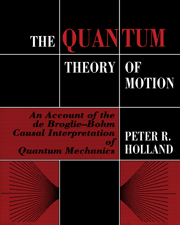 The Quantum Theory of Motion
The Quantum Theory of Motion Book contents
- Frontmatter
- Contents
- Preface
- 1 Quantum mechanics and its interpretation
- 2 Hamilton–Jacobi theory
- 3 Elements of the quantum theory of motion
- 4 Simple applications
- 5 Interference and tunnelling
- 6 The classical limit
- 7 Many-body systems
- 8 Theory of experiments
- 9 Spin ½: the Pauli theory
- 10 Spin ½: the rigid rotator
- 11 The Einstein–Podolsky–Rosen experiment and nonlocality
- 12 Relativistic quantum theory
- References
- Index
11 - The Einstein–Podolsky–Rosen experiment and nonlocality
Published online by Cambridge University Press: 20 January 2010
- Frontmatter
- Contents
- Preface
- 1 Quantum mechanics and its interpretation
- 2 Hamilton–Jacobi theory
- 3 Elements of the quantum theory of motion
- 4 Simple applications
- 5 Interference and tunnelling
- 6 The classical limit
- 7 Many-body systems
- 8 Theory of experiments
- 9 Spin ½: the Pauli theory
- 10 Spin ½: the rigid rotator
- 11 The Einstein–Podolsky–Rosen experiment and nonlocality
- 12 Relativistic quantum theory
- References
- Index
Summary
Assessment of Einstein's argument
Is quantum mechanics complete and local …
It was observed in §1.4 that Einstein's method of criticizing the orthodox view of quantum theory was to focus on examples whose special characteristics could be used to show that adherence to the completeness assumption compels one to adopt ‘unnatural theoretical interpretations’. It was a way not of disproving the conventional interpretation by attempting to locate in it some logical flaw, but of pushing it into a corner that in Einstein's view no one would seriously want to inhabit. The paper of Einstein, Podolsky & Rosen (EPR) (1935) is the most famous component of this programme and the purpose of this chapter is to analyse the extent to which the arguments presented in it are compatible with the quantum theory of motion.
From contemporaneous correspondence it appears that the EPR paper was written by Podolsky and that Einstein did not consider that the point which was really troubling him had been made explicit (Fine, 1986, Chap. 3). According to Einstein's accounts, EPR had the following purpose: to show that if one believes the wavefunction exhausts all the statements that can be meaningfully asserted about a physical system, then one must also accept that the real physical state of the system depends on what befalls another system with which it has previously interacted, no matter how far apart the two systems may become.
Information
- Type
- Chapter
- Information
- The Quantum Theory of MotionAn Account of the de Broglie-Bohm Causal Interpretation of Quantum Mechanics, pp. 458 - 497Publisher: Cambridge University PressPrint publication year: 1993